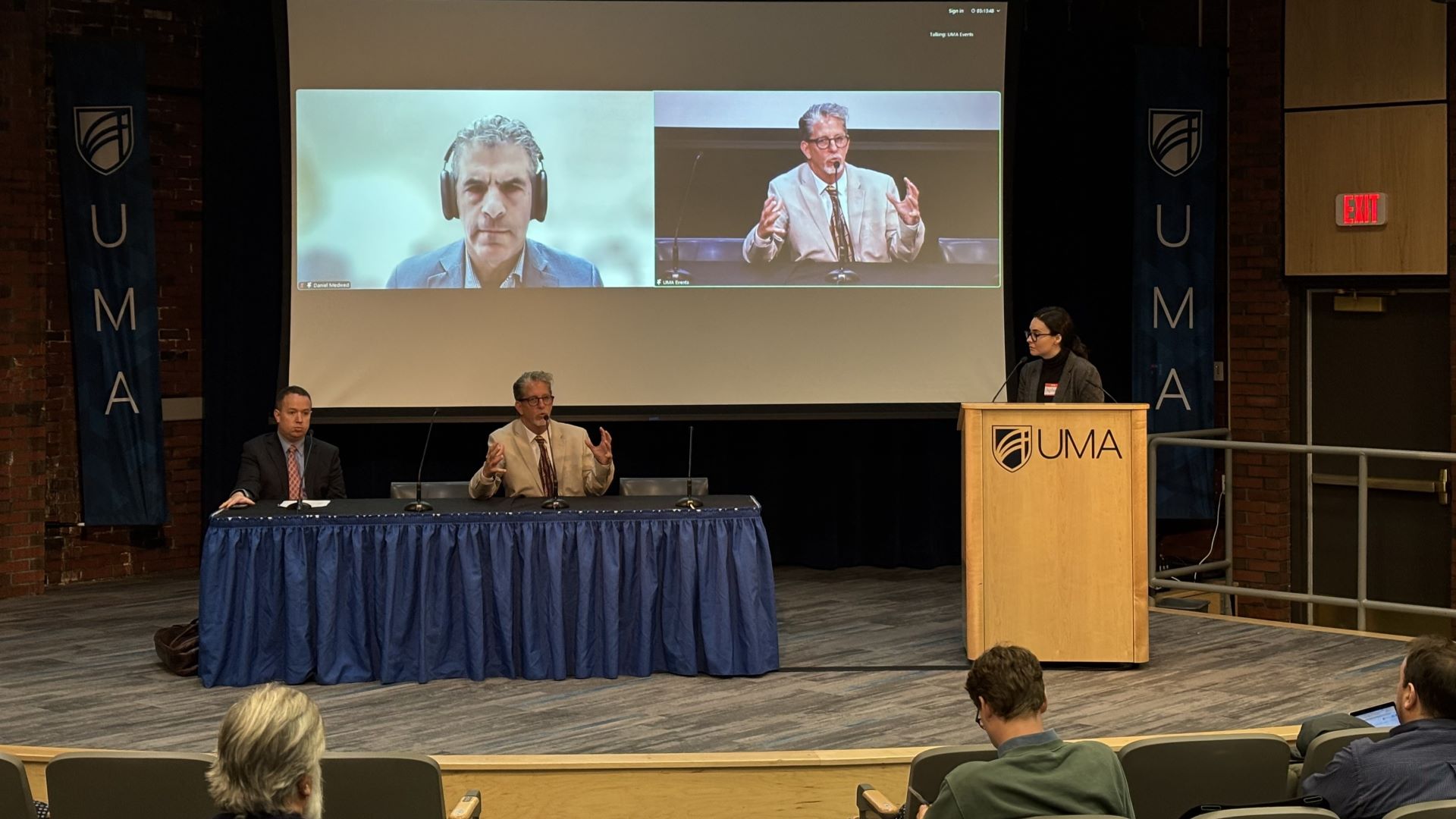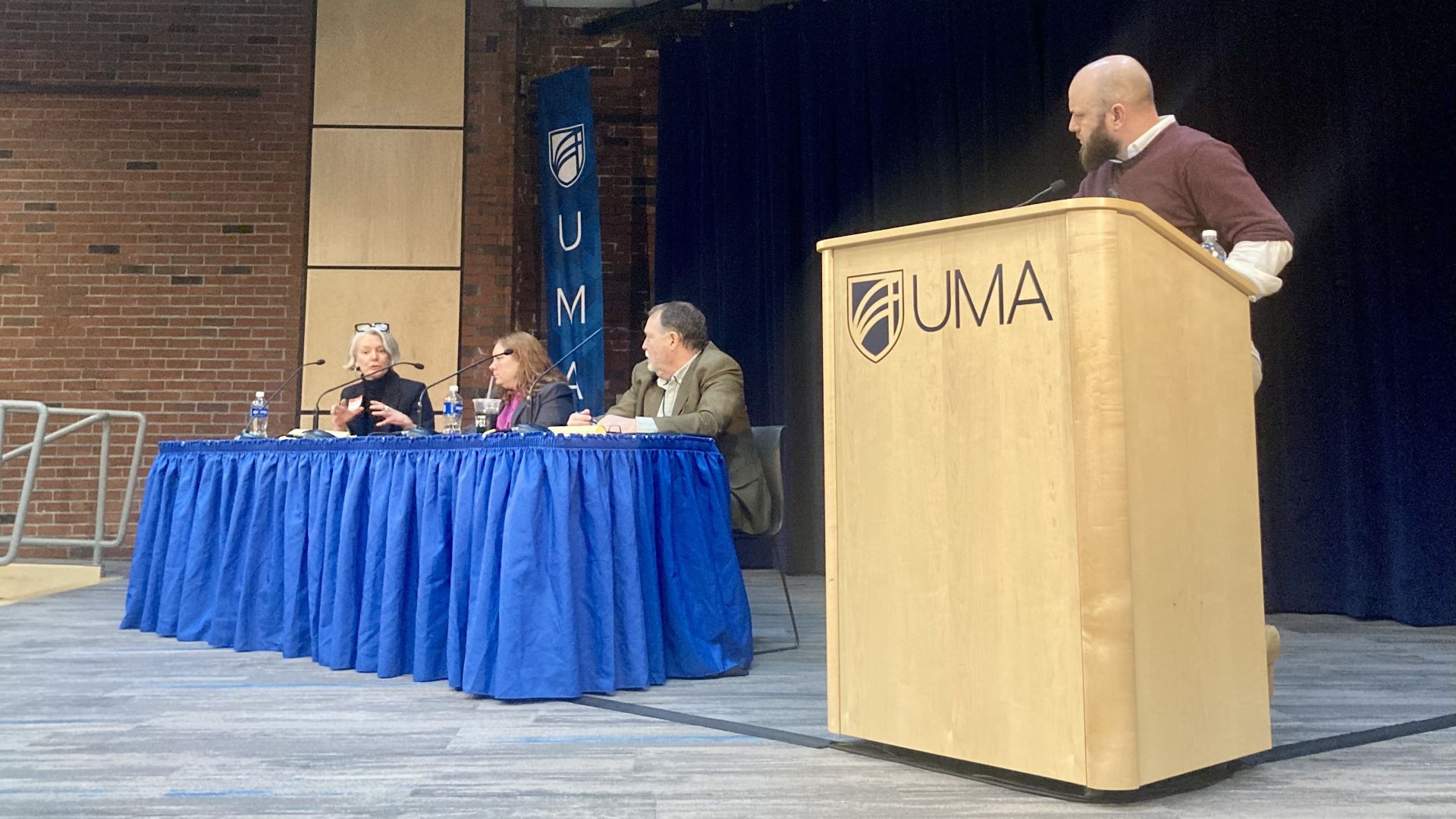Attorneys, law students and others interested in criminal defense gathered at the University of Maine at Augusta on Tuesday for a day-long indigent defense symposium co-hosted by The Maine Monitor and the Maine Indigent Defense Center.
Robert Ruffner, director of the Maine Indigent Defense Center, began by saying that whether the state is living up to the Sixth Amendment is in doubt.
“While there have been great changes over the last fifteen to twenty years in how Maine provides representation for our poor and those in need,” he said, “the question still remains: Are we meeting our obligations as a state, and as a society?”
The Sixth Amendment guarantees criminal defendants the right to a speedy trial and the assistance of a lawyer. As of Monday, more than 1,000 criminal and child protection cases in the state lacked an attorney. This is up from around 100 indigent cases in August 2023, when Maine Supreme Court Chief Justice Valerie Stanfill described the situation as a “crisis.”
Until recently, Maine was the only state in the country without public defenders, relying solely on private attorneys. The ACLU of Maine sued the state over its indigent defense practices, and the case is still playing out in the courts. Maine has begun to open public defender offices across the state, but has struggled to keep up with the number of cases requiring representation.
The first panel, moderated by government accountability reporter Josh Keefe, asked how Maine got itself into this crisis. Ruffner, along with Ron Schneider, the general counsel and vice president of legal affairs at the University of New England, and Tina Nadeau, executive director of the Maine Association of Criminal Defense Lawyers, discussed the ways in which defense lawyers resisted change over the years and how the pandemic exacerbated the attorney shortage.
Nadeau also placed blame on prosecutors, saying they needed to bring fewer cases by focusing more on serious crimes and less on simple shoplifting and possession charges.
The challenges attorneys are facing when representing poor clients often go beyond the legal system, Ruffner said, including helping people access mental health or substance use treatment. He noted that many people end up in the criminal justice system because other government agencies are failing to provide services.
“We think that there’s this safety net that exists,” he said. “It really isn’t there.”
The second panel, moderated by deputy editor Stephanie McFeeters, examined the public defense systems in other states and looked for lessons Maine could draw from its neighbors in New Hampshire and Massachusetts.
David Carroll, executive director of the Sixth Amendment Center, said that while there are challenges in public defense across the country, Maine’s ongoing failure to provide representation stands out.
Kyle Robidas, an attorney with the New Hampshire Public Defender’s Office, described his office’s recruitment and retention efforts, including a five-week training program for each year’s class of new attorneys, which he said creates a strong sense of community.
Daniel Medwed, a professor at Northeastern University, encouraged the state to “make lemonade” and learn from what’s working elsewhere, emphasizing the need for a strong institutional voice that could advocate on behalf of the public defense system.
The third panel, also moderated by Keefe, focused on the state’s plans to fix the problem, including current efforts to staff new public defender offices in Bangor, Caribou and Ellsworth.
Jim Billings, executive director of the Maine Center for Public Defense Services, said the eventual goal is to have public defense offices take half of all indigent criminal cases in the state. To do that, the offices need to recruit new lawyers and people from out of state rather than just pull from people already doing the work as private attorneys.
Frayla Tarpinian, who heads the Augusta public defender’s office, described her journey from private defense attorney to prosecutor to district defender, and explained how she’s working to create an institutional structure that not only allows her office to take a more systematic approach to the work but that also supports private criminal defense attorneys.
“I burned out because I didn’t have community,” she said. “Fostering that sense of community is a responsibility that my office takes seriously.”
Sarah Branch, a professor at UMaine Law who directs the Youth Justice Clinic, noted that several members of the school’s Students for the Sixth Amendment group were in the audience but that the state had to figure out how to attract people who might be on the fence about a public defense career because of concerns about work-life balance.
“Doing defense work is fun. Is it always fun? Do we win? Winning needs to be redefined,” she said. “Does your client feel like they have a voice? That can be your success for the day.”

Billings warned that if the Maine government doesn’t allocate the resources necessary to preserve defendants’ constitutional rights, a state or federal court is likely to step in.
“There’s going to be at some point a court order, state or federal, similar to Oregon’s, that forces the state to release people and cases will be dismissed and whether those people are guilty or not will not be adjudicated,” Billings said, noting that if that happens “public safety will suffer.”
He also agreed that the crisis is an opportunity to improve justice in Maine, pointing to the first panel’s discussion about prosecutorial power and the option to dismiss cases that aren’t serious violent crimes, rather than “aggregating the third stolen packet of M&Ms into a felony that lasts on the docket for a year and a half.”
“Those are the kind of things that could come out of a crisis, if the state is serious about reexamining the way it has always done things,” Billings said. “If it is not, then this opportunity will be wasted.”







